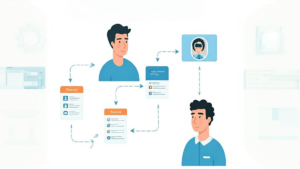
Automation has completely changed the way companies manage their processes, and one of the areas that has benefited the most is lead generation. In an increasingly digital world, relying on manual methods to attract and manage new potential clients is not only inefficient but can also cost time and opportunities. This is where automating lead generation within a CRM (Customer Relationship Management) system comes into play.
Automating lead generation in a CRM not only improves operational efficiency but also helps optimize tracking, data analysis, and decision-making based on accurate information. In this blog, we will explore how automation can revolutionize the way you manage leads, the benefits it provides, and why it is an intelligent investment for your business.
What is Lead Generation Automation in a CRM?
Lead generation automation involves using tools and automated processes to identify, capture, and manage new potential clients efficiently. Instead of manually performing repetitive tasks like sending welcome emails or categorizing client data, an automated CRM system handles these tasks. This allows marketing and sales teams to focus on more strategic activities, such as closing sales and building relationships with clients.
Modern CRMs, like HubSpot or Salesforce, include features that allow automation from lead capture to segmentation and personalized tracking. With these systems, you can set up automated workflows that activate when a lead performs a specific action, like downloading an e-book or signing up for a free trial.
Benefits of Automating Lead Generation
1. Time Savings and Efficiency Improvement
One of the biggest benefits of automating lead generation is time savings. Automation allows repetitive tasks, like lead classification or follow-up emails, to be carried out without human intervention. This frees up your sales and marketing teams to focus on more valuable tasks.
For example, instead of spending hours manually sorting incoming leads, an automated CRM can automatically filter leads based on their level of interest or behavior, assigning them to the appropriate sales team. This not only saves time but also boosts productivity.
According to a report from Nucleus Research, companies that implement automation in their CRM experience a 14.5% increase in sales productivity and a 12.2% reduction in marketing costs. Automation not only makes work faster but also reduces human error and optimizes resource usage.
2. 24/7 Lead Generation
With automation, you don’t have to worry about missing opportunities outside of business hours. An automated CRM works constantly, capturing leads 24 hours a day, 7 days a week. This means that, even when your team is unavailable, your CRM system continues to operate, collecting lead data, sending automated responses, and nurturing leads that are ready to convert.
For example, if a potential client visits your website in the middle of the night and leaves their contact information, the CRM system can automatically send them a welcome email with relevant information about your products or services. This ensures a quick response, increasing the likelihood of maintaining their interest.
According to HubSpot, companies that respond to leads within the first hour are seven times more likely to qualify the lead compared to those that take longer. Automation allows you to seize every opportunity, even when the sales team is unavailable.
3. Improved Lead Quality
Another significant benefit of automating lead generation is the improvement in lead quality reaching the sales team. An automated CRM can classify and segment leads based on predefined criteria, such as website behavior, interest in specific products, or interaction with emails.
This means that the leads reaching your sales team are already qualified and closer to making a purchasing decision. Automation removes irrelevant leads or those not ready to buy, allowing your sales team to focus on potential clients more likely to convert into actual sales.
A report from Marketing Sherpa found that 79% of leads never convert into sales. However, CRM automation can help increase the conversion rate by improving the quality of leads reaching the final stage of the sales process.
4. Personalized Follow-Up
Automation does not mean sacrificing personalization. In fact, automated CRMs allow for personalized interactions more effectively, as they collect detailed information about each lead. This enables every follow-up email or call to be based on specific actions the lead has taken, such as content downloads or webinar attendance.
For example, if a potential client shows interest in a specific product by clicking a link in an email, the CRM can automatically send them more related information or notify the sales team to provide a personalized follow-up. This improves the client experience and increases the likelihood of conversion.
According to a study by Accenture, 91% of consumers are more likely to buy from brands that remember their preferences and offer personalized recommendations. Automation enables this level of personalization, enhancing relationships with potential clients and increasing retention.
5. Optimization of the Sales Process
Automating lead generation also improves the sales process, as it simplifies the way leads move through the sales funnel. Automated CRMs allow the design of workflows that guide leads efficiently through their buying journey.
For example, an automated workflow can start when a lead shows interest in a product, sending automatic emails with relevant information, and finally passing the lead to the sales team when ready for a deeper conversation. This ensures that each lead receives the right attention at the right time, without requiring constant manual follow-up from sales and marketing teams.
According to Salesforce, companies that automate their sales processes experience a 30% increase in operational efficiency, as sales teams spend more time closing deals and less on administrative tasks.
Tools for Automating Lead Generation in CRM
There are several tools and platforms that facilitate lead generation automation in a CRM. Some of the most popular include:
- HubSpot: One of the most comprehensive platforms in terms of CRM and automated marketing. It offers advanced functionalities for lead capture, segmentation, automated emails, and behavior analysis.
- Salesforce: With Salesforce, companies can automate their workflows, create automated marketing campaigns, and manage their leads more efficiently.
- Zoho CRM: Zoho is another CRM platform that enables lead generation process automation. Its tool includes segmentation and leads scoring functions, making automated follow-up easier.
- ActiveCampaign: Ideal for small and medium-sized businesses, ActiveCampaign offers advanced automation for email marketing campaigns, lead segmentation, and automated follow-up.
Conclusion
Automating lead generation in a CRM is a key strategy for any company looking to improve efficiency, optimize resources, and increase conversion rates. It not only saves time and effort but also improves the quality of leads reaching the sales team, personalizes the customer experience, and ensures that no lead gets lost along the way.
With the right tools, like HubSpot, Salesforce, or Zoho CRM, you can implement automated processes to effectively manage your leads and help your sales team focus on closing more deals. Automation is the future of lead management, and those who adopt this strategy will be better positioned to compete in an increasingly digital market.






No comment yet, add your voice below!